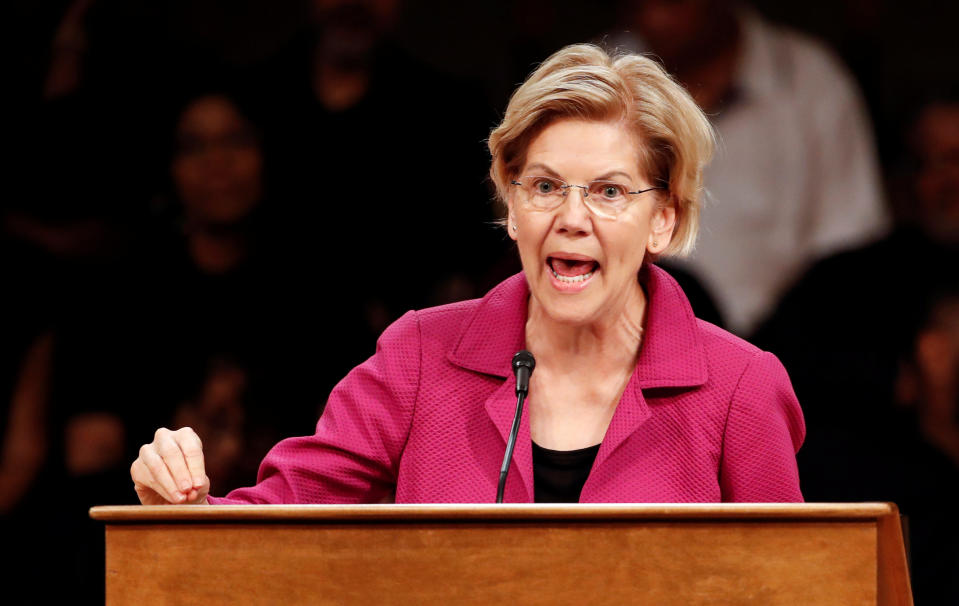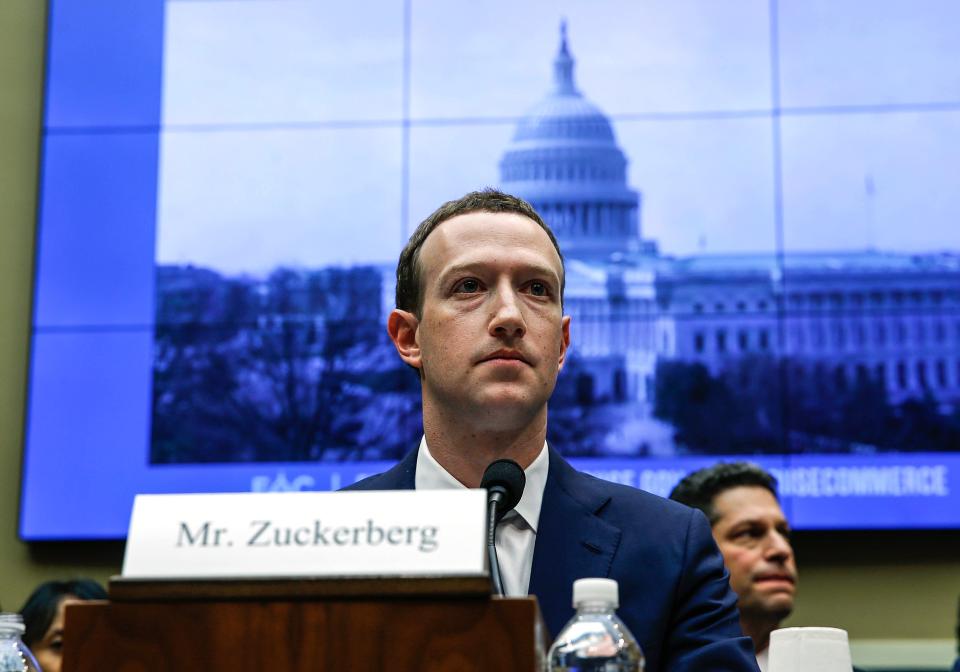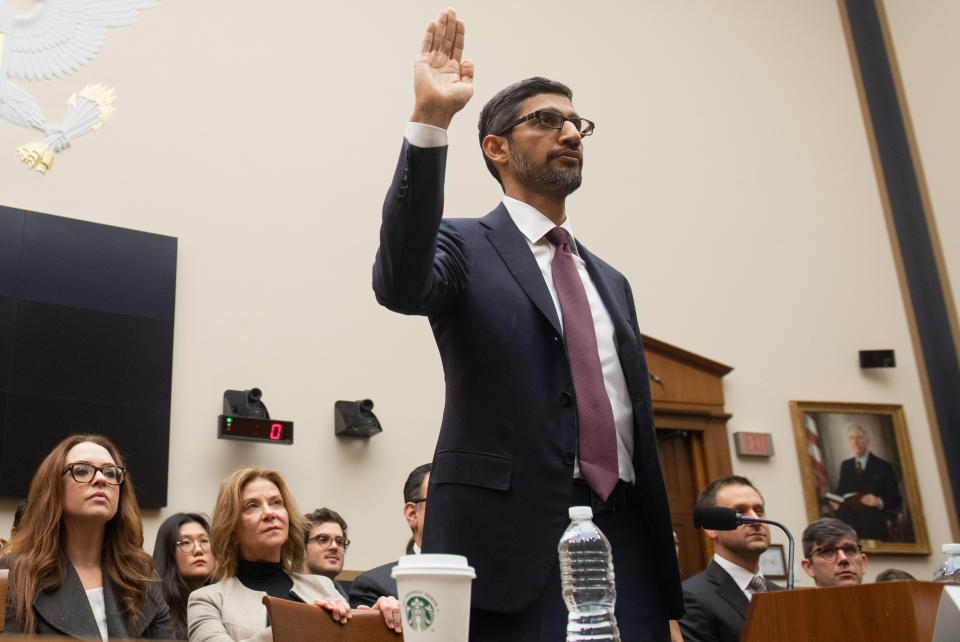Why the U.S. government is coming for Amazon, Google, Facebook, and Apple
Big Tech is facing a reckoning the likes of which the industry has never seen. Titans like Amazon (AMZN), Apple (AAPL), Google (GOOG, GOOGL), and Facebook (FB) are dealing with existential threats on multiple fronts. Antitrust enforcement, election interference, free speech, hate speech, and a number of other important matters are all coming to a head at the same time, and that makes it challenging to comprehend the troubling landscape for the country's most prosperous industry.
To help make sense of it all, we're looking at the biggest names in tech, and examining the problems they'll soon have to confront.
Amazon
Amazon is one of the largest retailers in the world, but CEO Jeff Bezos's empire has a slew of detractors calling for, among other things, increased taxes on the business and, in the most extreme case, a full-blown breakup.
Presidential candidate Bernie Sanders (I-VT), who is waging an ongoing war with the company, is currently calling for Bezos to improve working conditions for Amazon's fulfillment center employees. Sanders fired off his most recent salvo against the company via Twitter, linking to a story by The Daily Beast detailing the plight of employees, including those who have threatened to commit suicide.
Sanders has also hit Amazon for not paying any federal income taxes for the second year in a row. The company does pay corporate taxes.
Presidential candidate Senator Elizabeth Warren (D-MA), meanwhile, has laid out a plan to dismantle tech giants including Amazon that starts with naming the company as a platform utility, and limiting its ability to sell its own Amazon Basics products through Amazon.com. What's more, Warren would seek to undo Amazon's acquisitions of organic grocery store chain Whole Foods and shoe e-tailer Zappos.

Then there are reports that the Federal Trade Commission is looking into Amazon's business practices to determine if the company is using anticompetitive practices to get ahead of other retailers.
The Retail Industry Leaders Association, a trade group representing some of the largest retailers in the world, is backing the FTC's efforts. It sent a letter to the commission asking it to look into potential anticompetitive practices by the e-commerce giant, as well as Google.
Amazon has also faced pressure from President Donald Trump, who claims the company has a sweetheart deal with the U.S. Postal Service that hurts the Post Office's bottomline. But some analysts have said that the Post Office's problem is that people have turned away from sending letters and postcards in favor of emails and text messages, and that Amazon's business actually helps the service.
Apple
While the FTC is looking into potential antitrust issues at Amazon, the Department of Justice is on Apple's case. The iPhone maker's biggest vulnerability looks to be what made the company's smartphone so indispensable in the first place: the App Store.
The problem is that Apple maintains complete control over its app marketplace, down to what apps can and can't appear in it. That could soon change, though. In May, the Supreme Court allowed a lawsuit to move forward claiming the 30% fee Apple charges app developers for the sale of their apps through the App Store is anticompetitive.
Spotify has also raised concerns about how much Apple charges for the sale of apps through the store. In March, the streaming music service company lodged a complaint against Apple with the European Union, claiming the tech giant's App Store policies were unfair and anticompetitive.
Apple's App Store fee structure allows the company to charge developers 30% of the price of the sale of an app. If the app is a subscription service, Apple charges 30% of the price for the first year, then 15% for each following year.
Apple has responded to criticism of its App Store structure by saying that without the store, companies like Spotify would never have reached the levels of success they now see. What's more, the company says that 84% of apps are free and their developers don't pay any fees to Apple.
Sen. Warren, however, isn't hearing any of that. Warren told The Verge, that she would also push Apple to stop selling its own apps in the App Store. If such a move went forward, that would be a huge blow to the company, which is banking on apps like Apple Music and Apple TV+ to boost Apple's bottom line amid a global slowdown in smartphone sales.
Facebook's problems are among the most striking in the tech space. Not only is the company being examined for potential anticompetitive business practices, but it's also facing scrutiny for how it handles hate speech, free speech, and election interference.
Facebook's own co-founder, Chris Hughes, wrote an op-ed in The New York Times in which he called for Facebook to be broken up, saying that it wields too much power over consumers. Hughes went as far as to call CEO Mark Zuckerberg's power as the head of Facebook unprecedented and un-American.
Facebook's reputation also hasn't recovered from the slew of self-inflicted scandals it faced in 2017. The Cambridge Analytica debacle revealed that a political consultancy firm was able to abuse Facebook user data to aid in the election of President Trump without input from those users.

The company was also slammed for its slow response to Russian's 2016 election interference campaign. Zuckerberg initially dismissed the idea that the Russian campaign could have impacted the election, before relenting to pressure and admitting that the company needed to do more to protect election integrity.
Earlier this year, Facebook faced heavy criticism when a shooting in Christchurch, New Zealand, was live-streamed on the site. According to Facebook, the video, which showed the shooting in a first-person view, was initially viewed just 200 times. But the video was still live for several minutes after it had concluded, and Facebook had to be told about it by the local police in New Zealand before taking it down.
By that time, the video had already spread across the internet. It's still out there, and is regularly reuploaded, though Facebook is fighting each upload.
More recently, the company has had to answer questions about why it allowed a video doctored to make House Speaker Nancy Pelosi look inebriated to remain online. Zuckerberg admitted that his company was too slow to act in labeling the video a fraud, but said he wouldn't take it down.
Zuckerberg has said that he doesn't want Facebook to serve as a free-speech moderator, and has called on the government to intervene. As with Amazon, the FTC is looking into Facebook's practices to determine if there's any need to investigate the firm for anticompetitive behavior. The commission, however, hasn't revealed exactly what it is looking at inside of Facebook.
Google is one of the most powerful firms on Earth. It's the largest internet search provider in the world, one of the largest digital ad sales companies, and the most visited website on the web. But that's also brought plenty of scrutiny to the business.
Elizabeth Warren has lumped Google in with Facebook, Apple, and Amazon as a company that needs to be broken up through antitrust measures. Specifically, she says the company's search engine and ad exchange businesses should be split apart.

She also states that Google should be forced to reverse its mergers with Waze, Nest, and DoubleClick, all of which have already been fully integrated into the company. The DOJ is also looking at Google for any potential antitrust matters.
Google has already been fined three times by the European Union for anticompetitive business practices. The most recent fine topped out at the equivalent of $1.69 billion and came after the E.U. said Google was prohibiting users of its AdSense platform from running advertisements for competing search engines. Google is challenging the fine.
Like Amazon, Google has also come under fire from Trump, who has made the unfounded claim that the company purposely promotes content that paints him in a bad light. That content though is pulled from websites across the internet, and only shows what popular news organizations are publishing on certain topics.
California cleaning up its backyard
California birthed many of the companies that dominate today's global tech market, and now it's working to bring them to heel. On Jan. 1, 2020, the state will enact one of the most stringent consumer privacy laws in the world.
Inspired by the E.U.'s General Data Protection Regulation, The California Consumer Privacy Act will force tech companies to inform consumers when their data is being collected, why it's being collected, how it's being used, and who it is being shared with.
Companies will also have to comply when consumers request that firms delete any information they have about them. What's more, the law will make websites include a conspicuously visible section that lets users opt out of having their data sold. In fact, the link will literally say "Do not sell my personal information."
Tech companies, naturally, aren't happy with the bill and are currently trying to water it down before it goes into effect. There's still plenty of back and forth wrangling going on between them and privacy advocates ahead of the law's implementation. When it goes into effect, though, it will immediately put a leash on the tech industry that has been missing since the inception of the consumer internet as we know it.
California's bill is important because it could end up serving as a model for a national consumer data privacy law, something that's currently missing. Lawmakers in Washington have already been working on similar data-privacy measures. One proposal from Senator Ron Wyden (D-OR) calls for companies to submit comprehensive reports on their privacy practices. If executives lie on those reports, they could face up to 20 years in prison.
Senator Josh Hawley (R-MO) has also pushed forward a proposed Do Not Track law that would force companies to abide by consumers' requests to not collect their data.
No matter how you look at it, change is coming to Silicon Valley, and it will impact how many of us use and interact with the sites and services we've come to rely on. How much it changes remains to be seen.
More from Dan:
Email Daniel Howley at [email protected]; follow him on Twitter at @DanielHowley.
Follow Yahoo Finance on Twitter, Facebook, Instagram, Flipboard, SmartNews, LinkedIn,YouTube, and reddit.
